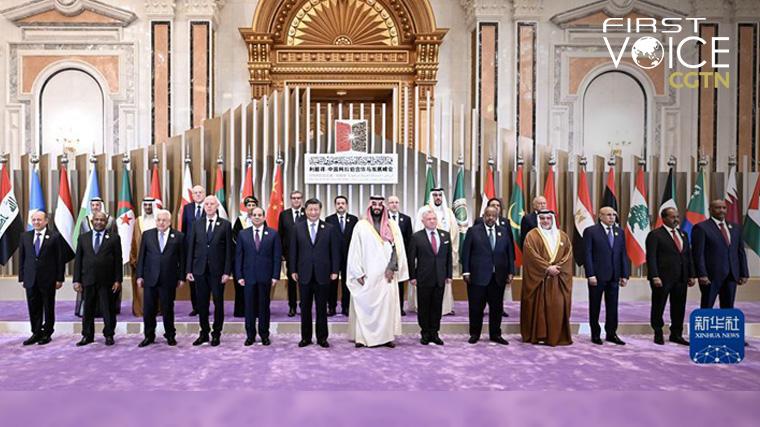
Editor's note: CGTN's First Voice provides instant commentary on breaking stories. The column clarifies emerging issues and better defines the news agenda, offering a Chinese perspective on the latest global events.
Chinese President Xi Jinping on December 9 attended the inaugural China-Gulf Cooperation Council (GCC) Summit and the China-Arab States Summit in the Saudi capital Riyadh, reaching the climactic pinnacle of his four-day visit to Saudi Arabia.
The first-ever China-Arab States Summit, alongside the China-GCC Summit, is the largest and highest-level diplomatic event between China and the Arab world since the foundation of the People's Republic of China in 1949 and is rightly being hailed as "an epoch-making milestone" in the history of China-Arab relations.
In his remarks at the China-Arab States Summit, Xi heralded the success of China-Arab countries relationships. He called on the countries to stay independent and defend common interests, focus on economic development and promote win-win cooperation, uphold regional peace and strive for common security, and increase exchanges among civilizations to enhance mutual understanding and trust.
Xi said that he is pleased to see the decisions by the Summit to build a China-Arab community with a shared future in the new era and to formulate the Outline of the Comprehensive Cooperation Plan Between China and Arab States, which lays out the blueprint for future China-Arab relations. In the next three to five years, China will work with the Arab side to advance eight major cooperation initiatives including development support, food security, public health, green innovation, energy security, inter-civilizational dialogue, youth development, and security and stability.
And in his speech at the China-GCC Summit, Xi said that China and the GCC states are natural partners for cooperation. He proposed five major areas for cooperation in the next three to five years, including energy, finance and investment, innovation and new technologies, aerospace and language and cultures.
The world has entered a new period of uncertainty amid heightened global turmoil including the ongoing Russia-Ukraine conflict and a long-drawn-out pandemic. Holding the two momentous summits at a time of such global turbulence and achieving such results reflect the strategic resolve of all parties to strengthen solidarity and coordination for mutual benefit as well as regional and global peace and security.
A reliable friend and partner
President Xi's call for building a China-Arab community with a shared future has been welcomed by partner countries in the Arab world. A recent poll also found more than 70 percent of respondents backing a "closer China-Arab" relationship. A vast majority of Arabs also view China as a reliable friend and partner.
China today is the largest trading partner of Arab states, including the oil-rich GCC states such as Saudi Arabia, Oman, the United Arab Emirates, Qatar, Kuwait and Bahrain.
The volume of bilateral trade between China and the Arab world topped $330.3 billion in 2021, 1.5 times more than a decade ago. Nearly $319.3 billion trade volume was achieved in the first three quarters of 2022, up 35.28 percent year on year. For several years, Beijing has remained the largest export market of petrochemicals products from the GCC states, importing over 200 million tons of crude oil in 2021.
China-Arab relations entered a new era in the past decade and have seen substantial progress across many fields. Collectively, China has established a future-oriented strategic partnership with all Arab states. Individually, China has established comprehensive strategic partnerships or strategic partnerships with 12 Arab states.
In recent years, the scope of China-Arab cooperation has expanded from the traditional field of oil and energy to agriculture and high-tech sectors. Cooperation in sectors ranging from 5G communications, new energy, space, and digital economy to the peaceful use of nuclear power has also gained momentum.
Zero-sum game, a Western fallacy
Trade and economic engagements aren't the only driving forces of China-Arab cooperation. As two ancient human civilizations, whose interactions dated back 2,000 years, and important members of the developing world, the two sides are key forces for upholding international fairness and justice. China and the Arab states value and respect sovereignty, independence and territorial integrity, and fervently oppose external interference while standing up to power politics and hegemonic tendencies.
As President Xi mentioned in the GCC summit, there is a deep trust between China and the GCC states. There is extensive complementary in the developmental and economic relationships. There are commonalities between the cultural values, and China and the states in the Arab region have faced the challenges in the international system together.
A section of Western politicians and analysts attribute unfounded motives to China's deepening engagement in the Arab world, claiming Beijing is trying to occupy the "great power vacuum" at a time when the U.S.'s strategic presence is dwindling in the region. The view reflects their uni-focal approach of looking at international relations as a zero-sum game between global powers.
The notion that the progress of China-Arab relations comes at the cost of the U.S. has no rationale. The Arab world's relations with Beijing and Washington aren't mutually exclusive as some Western interlocutors would have us believe. Twenty Arab states have signed documents on Belt and Road cooperation with China. 15 have become members of Asian Infrastructure Investment Bank. China's relations with its Arab partners are based on mutual understanding and a common pursuit for development and prosperity.
President Xi's Saudi visit and his participation at the two high-powered summits with Arab and GCC leadership in Riyadh will be remembered for propelling the comprehensive relationship between two historically-connected civilizational regions and their peoples in a direction that sets the foundation for a more prosperous China and Arab world. These meetings are milestones in the history of China's relationship with the region. With the blueprints laid out, it is set to take China and the region to a more promising future of friendship and cooperation.

 中文
中文



